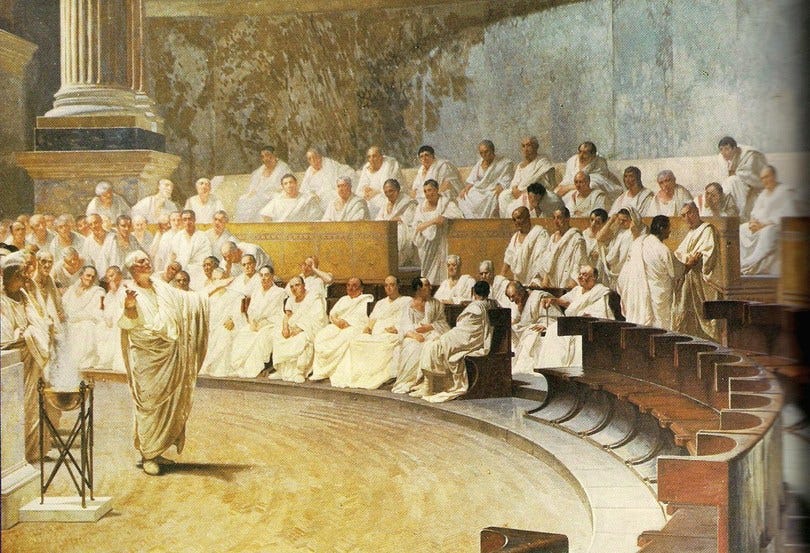Modern Democracy and Its Ingrained Autophagy
Democracy as we practice it today is a construct perfected through trial and error over the course of the formation of the modern nation state which started in the 19th century. Loosely based on what we believe Greek and Roman democracies to have been, we, in fact, altered the old concept gradually increasing the body of those with voting rights to its contemporary size when almost everyone is allowed to vote and thus participate in the election of the system leadership.
Limitations aside, the current system, has been argued, is the best we can possibly envision. What we talk less about is the ingrained autophagy of this system, its intrinsic ability to destroy itself through the democratic process itself. In other words, there is always the possibility that a party or a leader democratically elected may take advantage of the support given to them by the people who voted them in office and effectively cease to follow the rules of democracy by establishing an autocratic regime. This limitation of democracy is not a thing of the past when Roman rulers of the republic would overthrow the Senate and make themselves emperors, but it took place as recently as 1932 when a rather obscure Austrian-born politician named Adolf Hitler obtained over 35% of the votes in his electoral race against Paul von Hindenburg for the German presidency. Those elections, democratically held, confirmed Hitler’s political career and… the rest is history.
The very recent elections for the 751 seats of the European Parliament representing the 28 member states of the union are, I believe, yet another example of people democratically electing against democracy itself. More than one in seven members of the newly-elected parliament have ran campaigns focused on political principles going either against the very foundation of the European Union: they are against migration (internal or external), against free movement of labor force inside the union, and even against their country’s continued membership in the European Union, or against human rights altogether, proposing ethnic, religious and racial cleansing, deportations of residents of their countries or forbidding of religions and religious practices. Or, doing so not only goes against the principles of democracy, but against those of humanity and human rights, practically rendering democracy ineffective.
Let’s take, for instance, the big winner of the European elections in France, the (in)famous National Front, led by Marine Le Pen, the daughter of the Jean-Marie Le Pen, the French neo-Nazi who repeatedly called the gas chambers “a point of detail of the history of World War II” and staunch proponent of en mass deportations of French Muslims “in human and dignified conditions” to the countries of their or their ancestors’ origin. The Front secured close to 25% of the votes in France, thus sending 24 French representatives to Brussels for the next five years. Le Pen’s party ran its campaign under the slogan “No to Brussels, Yes to France,” and their victory has been called an “earthquake for France and Europe” by the French prime-minister, Manuel Valls. Marine Le Pen, on the other hand, did not hide her satisfaction and invoked the very principles of democracy in her victory speech: “The people have spoken loud and clear ... they no longer want to be led by those outside our borders, by EU commissioners and technocrats who are unelected. […] They want to be protected from globalization and take back the reins of their destiny.” What remains unclear is what will the representatives of the National Front, together with their colleagues from Hungary’s Jobbik, Greece’s Golden Dawn, or Austria’s Freedom Party, do in order to keep the promises they made to their voters. Will they indeed take it upon themselves to bring their countries’ membership to the EU to an end? And, if that succeeds, then what?
One or way or another, modern democracy has managed to keep its autocannibalistic tendencies at bay, although sometimes those who, knowingly or not, voted to have democracy terminated had to pay the price. The consequences of these elections are still ahead for the European Union, as it is its economic and political future. The most the current representatives coming from parties of the far-right (or left) can do now is challenge and slow down the majority in passing the much-needed laws to improve the overall situation of the union, thus perpetuating the crisis their political message thrives on. On the other hand, a well-balanced democratic debate between the center-right and the socialists, who are still the overwhelming majority of the new European Parliament can bring to an end the voters’ feeling that they are not well represented in Brussels and reset the European Union on a healthy course before the next elections in 2019.
NB The Romanian version of this article was published in LaPunkt.ro, on May 28, 2014.



